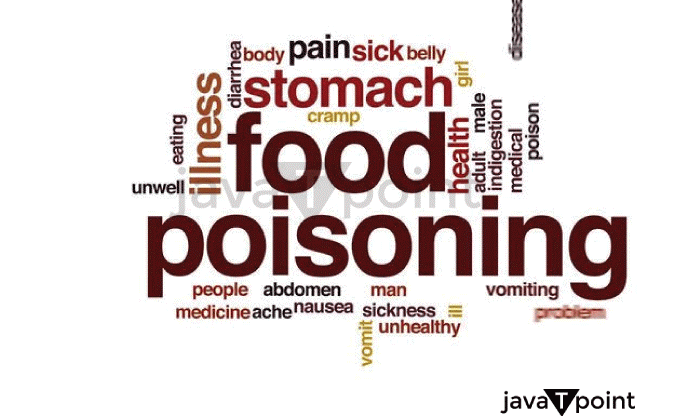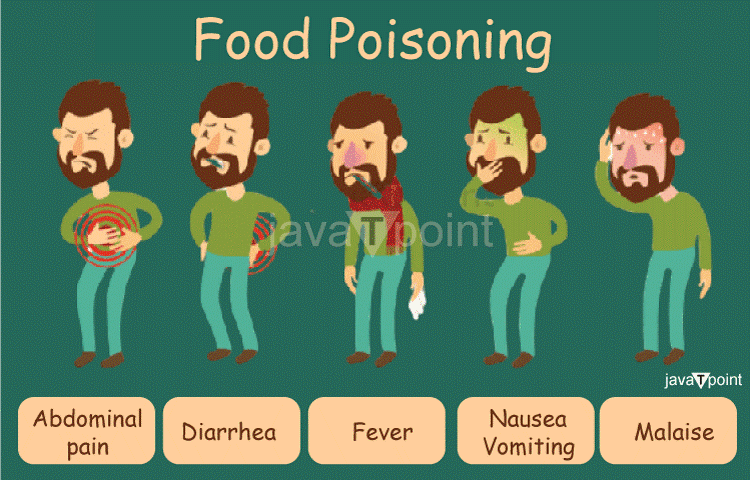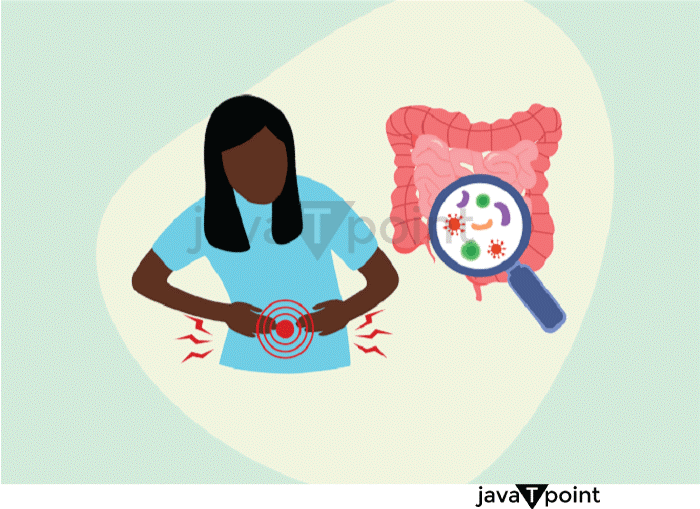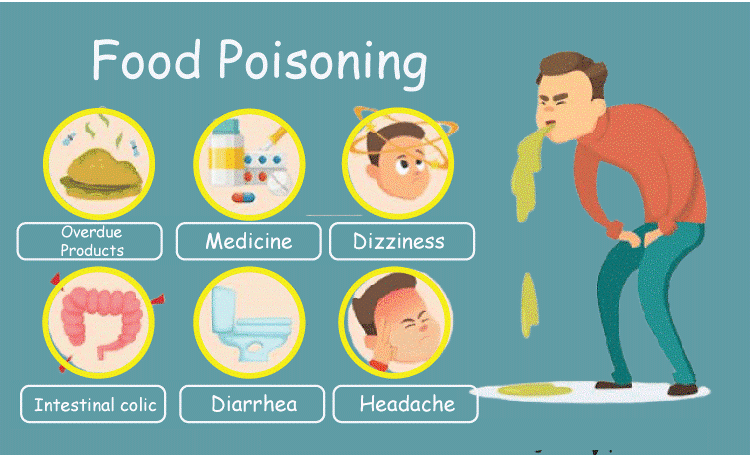Food Poisoning DefinitionFood Poisoning (also known as Foodborne illness) is an illness caused by pathogenic bacteria, viruses, or parasites that contaminate food as well as prions (the agents of mad cow disease) and toxins such as aflatoxins in peanuts, poisonous mushrooms, and different kinds of beans that have not been boiled for at least 10 minutes. 
Food poisoning symptoms vary depending on the cause but commonly include vomiting, fever, pains, and diarrhea. Even if infected food was removed from the stomach in the initial bout, microorganisms such as bacteria can travel past the stomach into the intestine and begin to multiply. Some microorganisms survive in the intestine. Symptoms of contaminants that require incubation may not appear for hours to days, depending on the cause and quantity consumed. Causes of Food PoisoningFood poisoning sickness is typically caused by inappropriate food handling, preparation, or storage. Good hygiene practices before, during, and after food preparation can lower the likelihood of getting sick. The public health community believes that frequent hand washing is one of the most reliable protections against the spread of food poisoning. 
Food safety is knowns as monitoring the food to ensure it does not cause food poisoning. A wide range of toxins which affects the environment can also cause food poisoning diseases. Furthermore, pesticides, pharmaceuticals, and naturally harmful substances such as vomitoxin, deadly mushrooms, or reef fish can all induce food poisoning diseases. BacteriaBacteria are a common cause of food poisoning. Bacterial infections were assumed to be more frequent in the past since few places had the capacity to test for norovirus and no active examining was conducted for this particular agent. Toxins produced by bacterial infections are delayed because bacteria require time to multiply. As a result, signs of poisoning usually appear at 12-72 hours or more after ingesting contaminated food. However, in other cases such as Staphylococcal food poisoning, symptoms can appear as fast as 30 minutes after consuming infected food. According to a 2022 study, washing raw chicken may raise the risk of pathogen transfer, but specific washing situations can reduce the risk of transfer. 
Bacteria like E. coli and Salmonella emerge to mind when thinking about hazardous bacteria. Salmonella is the most common bacterial cause of food poisoning in the United States. According to the CDC Trusted Source, Salmonella infection is responsible for an estimated 1,350,000 cases of food poisoning each year, including 26,500 hospitalizations. Campylobacter and Clostridium botulinum are two lesser known but potentially fatal bacteria that can be found in our food. SalmonellaSalmonella poisoning is commonly caused by raw eggs and undercooked chicken. It can also come from beef, pigs, vegetables, and processed foods that contain these ingredients. Salmonella is the most prevalent bacterial cause of food poisoning in the United States, accounting for the most hospitalizations and deaths. E. coliThis Bacteria is commonly present in undercooked meat and raw vegetables, generates a toxin that irritates your small intestine. The Shiga toxin causes foodborne sickness. ListeriaBacteria in soft cheeses, deli meats, hot dogs, and raw sprouts can cause listeriosis which is a potentially fatal infection in pregnant women. NorovirusNorovirus can be contracted by eating raw seafood, leafy greens, fresh fruits, or anything prepared by a sick person. This is the most prevalent virus linked to stomach flu. Hepatitis AViral hepatitis A can be transmitted by shellfish, fresh food, or contaminated water and ice. Although it is not a chronic infection like other hepatitis viruses it can harm your liver. Staphylococcus AureusStaphylococcus aureus (staph) infections arise when staph bacteria are transferred from people's hands to food. Meats, poultry, milk and dairy products, salads, cream-filled baked items, and sandwich fillings are frequently involved. Bacteria can impact many different sections of your body. Staphylococcus aureus food poisoning symptoms often appear within a few hours of consuming infected food, including stomach cramps, nausea, vomiting, and diarrhea. The sickness is usually self-limiting and resolves within a few days without needing therapy. CampylobacterThis common bacterial illness that causes severe gastrointestinal discomfort can last for weeks. Common culprits are undercooked chicken, meat, eggs, inadequately processed meats, infected vegetables, and raw (unprocessed) milk or water sources. Cross-contamination is another way it spreads. The illness is usually self-limiting, causes bloody diarrhea, and is rarely fatal. Shigellosis (Shigella)The Shigella bacterium is most found in raw vegetables, shellfish, and salads (tuna, potato, macaroni, chicken) with cream or mayonnaise. Because it might cause blood or mucus in your diarrhea, the infection is also known as bacillary dysentery. Risk Factors of Food PoisoningFood poisoning is a dangerous and potentially fatal condition caused by eating contaminated food or drink. Food poisoning risks vary based on several circumstances, including the type of food or drink taken in the presence of hazardous bacteria or other pathogens and the individual's total health and immune system. 
The following are some of the most prevalent risks related with food poisoning Gastrointestinal DistressOne of the most common symptoms of food poisoning is gastrointestinal distress, including diarrhea, nausea, vomiting, and abdominal cramps. Depending on the severity of the contamination and the individual's sensitivity to the infection these symptoms might be moderate or severe. DehydrationSevere diarrhea and vomiting can cause dehydration, which can be fatal if not controlled. When experiencing these symptoms, staying hydrated by consuming enough fluids, particularly water is critical. Kidney FailureCertain types of food poisoning such as E. coli or Salmonella can cause kidney failure in severe situations. This is particularly common in young children, older people, and those with weaker immune systems. Neurological SymptomsSome types of food poisoning can cause neurological symptoms such as headaches, dizziness, and nausea. Cross-contaminationCross-contamination and the spread of hazardous microorganisms can occur when raw and cooked meals come into contact. This can happen if you use the same cutting board or tools for raw and cooked meat or store raw meat above-cooked food in the fridge. Food RecallsFood products may be recalled in some situations due to contamination with hazardous microorganisms or other contaminants. It is critical to be updated about food recalls and dispose of recalled products as soon as possible. Allergic ReactionsCertain foods or substances such as peanuts, shellfish, or gluten, may cause allergic reactions in certain people. Even if the food is not contaminated eating it can cause a severe allergic reaction. DeathFood poisoning can be deadly in rare situations, especially in people with weaker immune systems or previous health issues. Who is Most at Risk from Food Poisoning?If your immune system is not as robust as it should be, you may be more likely to get sick from food poisoning or have a more severe reaction. Temporary factors, as well as long-term circumstances, might have an impact on your immunity. AgeImmune systems in children under the age of five are undeveloped. After the age of 65 the mature immune systems begin to diminish. PregnancyPregnancy is demanding on the body leaving you with fewer resources to fight illnesses than usual. Chronic IllnessesIllnesses that last a long time like infections, cancer, immunodeficiency illnesses, and autoimmune diseases are chronic ailments that can impair immunity. MedicationsCorticosteroids and immunosuppressive medications decrease your immune system and make you more inclined to sickness. Prevention of Food PoisoningThe most important strategy to prevent food poisoning is to use safe food handling practices. 
Those who harvest, handle, and prepare food must be cautious at all process stages to prevent contamination. For example CleanWash raw produce thoroughly in clean, hygienic water. Before preparing food, wash your hands and utensils. Wash and disinfect all surface your food will meet such as cutting boards, countertops, and plates. SeparateSeparate raw meats and eggs from fresh produce or other food products to avoid cross-contamination. Meat products may contain germs killed when cooked at the correct temperatures. If the bacteria travel to an uncooked food item, they may live and contaminate it. CookEnsure to properly cook meats and seafood with the proper temperatures to kill germs. Whole slices of beef well-seared on the outside can be pink on the inside. Ground meats must be well cooked, with no pink remaining. Fish should be opaque, not translucent, and flake easily with a fork. ChillRefrigerate or freeze cooked dishes within two hours of completion to prevent bacteria from developing. If the items contain gravy, sauces, mayonnaise, or creams, ensure they have been kept at suitable temperatures while still being served. Check for microbial development such as mold in your refrigerated goods. If dairy goods have passed their expiration dates or have an "off" colour dispose them. CommunityYour local public health department works to prevent food poisoning by notifying residents about potential outbreaks. Keep an eye out for public announcements of food recalls. Report food poisoning if you have it. Stay HydratedIt is essential to stay hydrated if you have a food poisoning. Electrolyte-rich sports beverages can be beneficial. Fruit juice and coconut water can help replenish carbs and alleviate weariness. Caffeine, which can irritate the digestive tract, should be avoided. Decaffeinated teas containing soothing herbs like chamomile, peppermint, and dandelion may help to soothe an upset stomach. Take Over-the-Counter (OTC) Medications.OTC drugs such as loperamide (Imodium) and Pepto-Bismol can help you control your diarrhea and nausea. However, you should consult a doctor before these treatments because the body uses vomiting and diarrhea to eliminate the poison. Furthermore, utilizing these medications may conceal the severity of your sickness and drive you to delay getting professional help. Pyrantel pamoate (Reese's Pinworm Medicine) is a popular pinworm treatment. Use Safe WaterUsing safe, clean water is critical for avoiding food poisoning. Drinking, cooking, and cleaning food should all be done with safe water. If you're unsure whether tap water is safe, boil it for at least one minute before using it. Be Aware of Expiration Dates.Before eating any item, always check the expiration date. Food past its expiration date may be tainted with hazardous bacteria or poisons. Also, ensure that perishable foods are appropriately stored and used before expiration. Practice Good HygieneOther than washing your hands before handling food, practicing good hygiene in other ways is crucial. For example, Avoid touching your face or hair when making food as this can transfer bacteria from your hands. When handling food, wear gloves, especially if you have any scrapes or wounds on your hands. If you have an infectious sickness, avoid handling food until you feel better. Avoid Dangerous FoodsSome foods are more likely than others to be contaminated with deadly microorganisms. For example, raw or undercooked eggs, pork, poultry, and shellfish are all high-risk foods. Unpasteurized products made from dairy such as raw milk and cheese can be harmful. If you are concerned about the safety of a specific meal, it is preferable to avoid it entirely. Treatment for Food PoisoningFood poisoning treatment varies based on the severity of the symptoms and the underlying cause of the sickness. The following therapies may be indicated in general: Rest and HydrationTo avoid dehydration, it is critical to rest and stay hydrated by drinking enough fluids, particularly water. MedicationsOver-the-counter medications such as diarrhea, nausea, and abdominal cramps may be prescribed to ease symptoms such as anti-diarrheal pills and pain relievers. AntibioticsAntibiotics may be directed to treat the underlying infection if a bacterial infection causes food poisoning. HospitalizationHospitalization may be required in severe cases of food poisoning to deliver intravenous fluids, electrolytes, and other treatments. ConclusionTo summarise, food poisoning is a significant health danger that can occur because of consuming contaminated food or drink. Food poisoning risks vary depending on several factors including the pathogen implicated and the individual's overall health and immune system. If you suspect you have food poisoning seek medical assistance if your symptoms are severe or do not improve within a few days or if you have any signs of dehydration or other significant problems. To prevent further sickness, it is also significant to identify and eliminate the source of contamination. Adopting these precautions may help protect yourself and your loved ones from food poisoning.
Next TopicForecast Definition
|
 For Videos Join Our Youtube Channel: Join Now
For Videos Join Our Youtube Channel: Join Now
Feedback
- Send your Feedback to [email protected]
Help Others, Please Share










